lesson1 1 肖增
(冀教版)五年级英语上册《Unit 1 Lesson 1》说课稿

(冀教版)五年级英语上册《Unit 1 Lesson 1》说课稿一、教材简介本课是《冀教版》五年级英语上册的第一课,名称为《Hello, I am Amy》。
本课主要介绍了自我介绍的基本句型、问候语及其回复,并引导学生进行简单的交流。
本课适用于五年级英语初学者,通过本课的学习,学生将掌握一些基本的口语表达技巧,并为后续英语学习做好基础。
二、教学目标1. 知识目标1.掌握基本的自我介绍句型及问候语;2.熟练运用英语进行简单交流;3.学习一些基本的英语口语表达。
2. 能力目标1.培养学生的口语交流能力;2.提高学生的听说能力。
3. 情感目标1.培养学生学习英语的兴趣;2.培养学生的自信心和独立思考能力。
三、教学重难点1. 教学重点1.掌握基本的自我介绍句型及问候语;2.熟练运用英语进行简单交流。
2. 教学难点1.教师如何引导学生进行简单的英语对话;2.如何培养学生的口语交流能力。
四、教学策略1.采取任务型教学法,通过学生之间的互动,提高学生的口语交流能力;2.采取情境式教学法,让学生在情境中学习,提高学生的学习兴趣;3.采用多媒体教学手段,让学生更加直观地感受英语的魅力。
五、教学步骤1. 导入(5分钟)用图片引导学生认识英语字母表,学生依次说出英文字母。
2. 学习自我介绍(20分钟)1.教师通过图片和视频等多媒体手段,引导学生学习自我介绍句型,如“Hello, my name is…”、“I am…”等;2.老师与学生进行示范式对话,并组织学生进行角色扮演。
3. 学习问候语及其回复(20分钟)1.教师通过图片和视频等多媒体手段,引导学生学习常用的问候语及其回复,如“How are you?”、“Fine, thank you.”等;2.老师与学生进行示范式对话,并组织学生进行角色扮演。
4. 进行小组交流(20分钟)老师分组,让学生进行小组交流,让学生互相介绍自己,并进行简单的英语对话。
5. 总结(5分钟)老师针对学生的表现,进行总结和点评,并要求学生进行反思。
现代大学英语第一册Lesson1
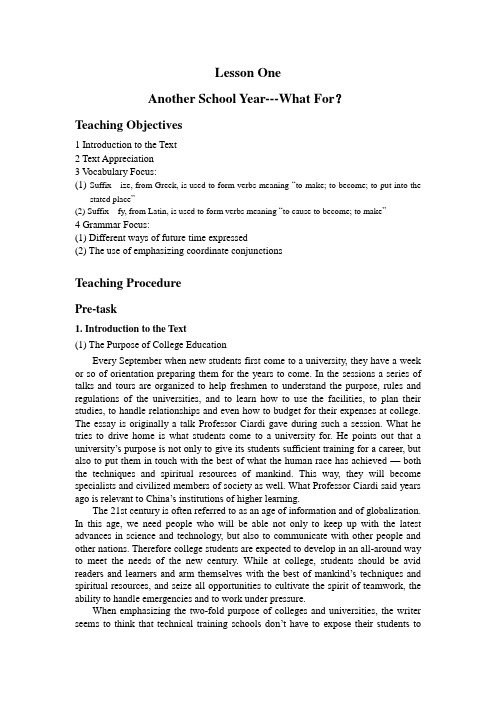
Lesson OneAnother School Year---What For?Teaching Objectives1 Introduction to the Text2 Text Appreciation3 V ocabulary Focus:(1) Suffix---ize, from Greek, is used to form verbs meaning “to make; to become; to put into thestated place”(2) Suffix---fy, from Latin, is used to form verbs meaning “to cause to become; to make”4 Grammar Focus:(1) Different ways of future time expressed(2) The use of emphasizing coordinate conjunctionsTeaching ProcedurePre-task1. Introduction to the Text(1) The Purpose of College EducationEvery September when new students first come to a university, they have a week or so of orientation preparing them for the years to come. In the sessions a series of talks and tours are organized to help freshmen to understand the purpose, rules and regulations of the universities, and to learn how to use the facilities, to plan their studies, to handle relationships and even how to budget for their expenses at college. The essay is originally a talk Professor Ciardi gave during such a session. What he tries to drive home is what students come to a university for. He points out that a university’s purpose is not only to give its students sufficient training for a career, but also to put them in touch with the best of what the human race has achieved — both the techniques and spiritual resources of mankind. This way, they will become specialists and civilized members of society as well. What Professor Ciardi said years ago is relevant to China’s institutions of higher learning.The 21st century is often referred to as an age of information and of globalization. In this age, we need people who will be able not only to keep up with the latest advances in science and technology, but also to communicate with other people and other nations. Therefore college students are expected to develop in an all-around way to meet the needs of the new century. While at college, students should be avid readers and learners and arm themselves with the best of mankind’s tech niques and spiritual resources, and seize all opportunities to cultivate the spirit of teamwork, the ability to handle emergencies and to work under pressure.When emphasizing the two-fold purpose of colleges and universities, the writer seems to think that technical training school s don’t have to expose their students toprofound ideas. We think that all schools, as well as colleges and universities, should aim at turning out useful and civilized members of society.(2) StyleAs it is originally a talk, the writer adopts a basically colloquial and familiar style. As you read, you feel as if the professor is talking to you face to face. To recreate the scene of his encounter with the tall boy in his office, he uses the direct speech. This way, the reader can imagine the ignorance and arrogance of the student. The sentence structure is generally not very complicated. But there are a few long and involved sentences in the second part of the text, for example, the last sentence in Paragraph 12. And the last paragraph consists of two very long ones.The tone in the first part is humorous and mildly sarcastic. The pharmacy major is referred to as “a beanpole with hair on top”, “this specimen” and “this particular pest”.2. Warm-up questions(1) Do you agree the point of view that universities are only for job training? Whatelse should a student strive for in a university?(2) How would you respond if your friend declares that he/she is only interested inlearning some job skill and therefore has no use for literature, philosophy, politics, history, art, music, etc.?Task- cycle1. ThemeThe author tries to clarify the purpose of a university: to put the students in touch with the best civilization that human race has created.2. StructurePart 1 (Paras.1- 8):The writer describes his encounter with one of his students.Part 2 (Paras.9-14):The author restates what he still believes to be the purpose of a university: putting its students in touch with the best civilizations the human race has created.3. Detailed study of the text (In this part, students are asked to take part in various activities.)(1) Let me tell you one of the earliest disasters in my career as a teacher.Let me tell you something that happened when I first became a teacher. It was one of the exasperating experiences in the first days of my teaching career.The word “disaster” often means “an unexpected event, such as a very bad accident, a flood or a fire that kills a lot of people or causes a lot or damage”. Here, used informally, it means “a complete failure”. The writer exaggerates the situation and uses the word humorously.(2) …I was fresh out of graduate school starting my first semester at theUniversity of Kansas City.…I was fresh out of graduate school starting my first semester at the University of Kansas City.be fresh out of/from sth. : to have just come from a particular place; to have just had a particular experience, e.g.Students fresh from collegeAthletes fresh from their success at the Ninth National Games(3) News as I was to the faculty, I could have told this specimen a number ofthings.Though I was a new teacher, I knew I could tell him what he could but did not say to the student.Note that the writer now referred to the student as a specimen in a humorous way, meaning he was typical of those students who came to a university just to get training for a career, as if he were typical of a certain species of animal.new to sth. : not yet familiar with sth. because you have only just started, arrived, etc.(4) I could have pointed out that he had enrolled, not in a drugstore-mechanicsschool, but in a college and that at the end of his course meant to reach for a scroll that read Bachelor of Science.I could have told him that he was now not getting training for a job in a technical school but doing a B.S. at a university.mean to do sth. : to intend to do sth.reach for sth. : to try to obtain sth.read Bachelor of Science: to have Bachelor of Science written on the certificate.(5) It would certify that he had specialized in pharmacy, but it would furthercertify that he had been exposed to some of the ideas making has generated within its history.The B.S. certificate would be official proof that the holder had special knowledge of pharmacy, but it would also be proof that he/she had been exposed to some profound ideas of the past.certify that … : to state officially, especially in writing that … , e.g.This is to certify that Ms. Li Lin worked at the IBM Beijing Office from January 1998 to June 2000.specialize in :to limit all or most of one’s study, business, etc. to a particular activity or subject, e.g.Professor Zhang specializes in American drama.My sister specializes in contract law.At age 30, he started a company specializing in home computers.generate: to produce or create sth. ,e.g.They have a large body of young people who are capable of generating new ideas. This machine can generate electricity in case of a power failure.(6) I could have told him all this, but it was fairly obvious he wasn’t going to bearound long enough for it to matter.I didn’t actually say all this to him, because I didn’t think he would stay at college very long, so it wouldn’t be important whether or not he knew what university education was for.be around: to be present in a place; to be availablematter (to sb.): to be important or have an important effect on sb. /sth. , e.g.It doesn’t matter whether or not you agree. My mind is made up.Does it matter if I write in pencil?(7) Nevertheless, I was young and I had a high sense of duty and I tried to put itthis way…Instead of telling him the importance of an all-round education, I tried to convince him from a very practical point of view.(8) You will see to it that the cyanide stays out of the aspirin, that the bull doesn’tjump the fence, or that your client doesn’t go to the electric chair as a result of your incompetence.You have to take responsibility for the work you do. If you’re a pharmacist, you should make sure that aspirin is not mixed with poisonous chemicals. As an engineer, you shouldn’t get things out of control. If you become a lawyer, you should make sure an innocent person is not sentenced to death because you lack adequate legal knowledge and skill to defend your client.be employed in doing sth. : (written) to spend your time doing sth. , e.g.The old man’s days were employed in reading, writing, and doing Chinese boxing. The old lady was busily employed in knitting sweaters for her grandchildren.see to it that: to make sure that, e.g.Can you see to it that all the invitations are delivered today?I’ll see to it that everything is ready before the guests arrive.average out to: (informal) to come to an average or ordinary level or standard, especially after being higher or lower, e.g.Meals at the university average out to about 10 yuan per day.The restaurant’s monthly profits averaged out at 30% last year.(9) Along with everything else, they will probably be what puts food on yourtable, supports your wife, and rears your children.In addition to all other things (such as satisfaction) these professions offer, they provide you with a living so that you can support a family-wife and children. (10) Will the children ever be exposed to a reasonably penetrating idea at home? Will your children ever hear you talk about something profound at home?be exposed to (usually, a new idea or feeling): to be given experience of it, or introduced to it, e.g.To learn more about the world we live in, we should be expose to different cultures.Studying abroad, he was exposed to a new way of life.(11) Will you be presiding over a family that maintains some contact with the great democratic intellect?Will you be head of a family who brings up kids in a democratic spirit?preside over: to be in charge or to control a meeting or an event, here used humorouslymaintain contact with: to keep in touch with, here used figuratively(12) Will there be a book in the house?Will you be reading serious books (not just popular fiction)?(13) Will there be a painting a reasonably sensitive man can look at withoutshuddering?What kind of pictures will you put up in your house? Will you have a painting in your house that shows some taste?(14)Me, I’m out to make money.Be out do sth. /for sth. : to be trying to get or do sth. , e.g.The company is out to break in to the European market.Look out for such end-of-the-year sales. These shops are out to trick you into buying what you don’t need.(15) “I hope you make a lot of it,” I told him, “because you’re going to be badlystuck for something to do when you’re not signing checks.”Note the sarcastic tone of the writer. In spite of what he had said, the student didn’t seem to be convinced. What the writer means here is something like this: If you don’t have any goal in life apart from making money to satisfy your desire for material riches, go ahead and make a lot of it.be stuck for sth : not to know what to do in a particular situation, e.g.In the middle of the speech, he was stuck for words (= he didn’t know how to go on).(16) If you have no time for Shakespeare, for a basic look at philosophy, for thecontinuity of the fine arts, for that lesson of man’s development we call history-then you have no business being in college.If you don’t want to improve your mind and broaden your horizon by studying a little literature, philosophy and the fine arts and history, you shouldn’t be studying here at college.have no business doing sth. /have no business to do sth. : to have no right to do sth. , shouldn’t have been/be doing sth. , e.g.You’ve no business telling me what to do.He has no business criticizing her about her make-up.(17) You are on your way to being that new species of mechanized savage, thepush-button Neanderthal.You will soon become an uneducated, ignorant person who can only work machines and operate mechanical equipment (one who doesn’t know anything about literature, music, the fine arts, culture in general, etc.).on the/one’s way to: on the point of experiencing or achieving, e.g.She is on the way to becoming a full professor.That bright young man is on his way to being the sales manager of the company. Nancy is well on her way to a nervous breakdown.new species of mechanized savage:new type of humans who are intellectually simple and not developed and who can only work machinesthe push-button Neanderthal:an uneducated, ignorant person who can only use/operate machines by pushing the buttons.(18) Our colleges inevitably graduate a number of such life forms, but it cannotbe said that they went to college; rather the college went through them-without making contact.A number of such push-button savages get college degrees. We cannot help that. But even with their degrees, we can’t say that these people have received a proper college education. It is more accurate to say that they go through college without learning anything.life forms: used sarcastically, meaning these people are living creatures, but can’t think or reasongo through (a person) (like a dose of salts):(of food, etc.) to be quickly excreted/to pass through the body as waste matter without being digested; here, used figuratively and sarcastically(19) Not one gets to be a human being unaided.No one can grow up to be a civilized person without the help of others.get to be/to do sth.: to reach the point at which you are, feel, know, etc. sth. , e.g. Once you get to know her better, you’ll realize she is a compassionate person.His absent-mindedness is getting to be a big problem.(20) There is not time enough in a single lifetime to invent for oneself everythingone needs to know in order to be a civilized human.To become a civilized person, you need to acquire the knowledge and develop the culture a civilized society needs. One lifetime is too short to create an environment for you to become civilized.a single lifetime: the time during which a person is alivea civilized human: a person who is pleasant, charming and without roughness of manner(21) You pass the great stone halls of, say, M.I.T., and there cut into the stone arethe names of the scientists.If you pass the great stone hall of a university, M.I.T. (Massachusetts Institute of Technology) for example, you’ll see the names of the scientists cut into the stone.(22) The chances are that few, if any, of you will leave your names to be cut intothose stones. Yet any of you who managed to stay awake through part of a high school course in physics, knows more about physics that did many of those great scholars of the past.Only very few, if any at all, of you will turn out to be great scientists and have your names cut into those stones. But if you were attentive enough in your high school physics class, any of you knows more about physics that many of those scientists whose names are cut into the stones.(the) chances are: it is likely(23) You know more because they left you what they knew, because you can startfrom what the past learned for you.You know more about physics not because you’re more talented that those scholars of the past, but because they left their knowledge to you, and because everything you first learn is what people learnt in the past. In other words, all human knowledge has been accumulated by people living in the past and has been passed on to us. You learn all this before you do any original research, or any research of your own.(24) And as this is true of the techniques of mankind, so it is true of mankind’sspiritual resources.This is the way we learn and develop the techniques of mankind. This is also how we inherit and advance mankind’s spiritual resources.Be true of (a person or a situation) : to apply to, e.g.It’s a wonderful opera. The music is superb. The same is true of the acting.The young tend to look ahead while the old like to look back upon the past. This is true in all nations(25) When you have read a book, you have added to your human experience. When you have read a book, you have enriched your life.(26) Read Homer and your mind includes a piece of Homer’s mind.When you read Homer’s works, you are sure to grasp some of his insights.(27) Through books you can acquire at least fragments of the mind and experience of Virgil, Dante, Shakespeare-the list is endless.Through reading their books, you can at least grasp a bit of the thinking and experience of such literary giants as Virgil, Dante, Shakespeare-there have been so many great thinkers and writers that it’s impossible to list them all here.(28) For a great books is necessarily a gift; it offers you a life you have not thetime to live yourself, and it takes you into a world you have not the time to travel in literal time.Because a great book is something given to us to enrich our lives. It presents to you a kind of life you don’t have a chance to experience yourself, and it describes for you places you don’t have time actually to visit.In literal time: in reality(29) A civilized mind is, in essence, one that contains many such lives and many such worlds.Basically, a cultured and educated person should know about such great variety of lives and worlds.In essence: basically, by nature, e.g.Hs is in essence an outgoing person.In essence they were asking for the impossible.(29) The faculty, by its very existence, say implicitly: “We have been aided bymany people, and by many books, in our attempt to make ourselves some sort of storehouse of human experience.”The existence of the faculty of the liberal arts college itself says in an implied way: “In our effort to make our faculty a place where our students can experience a variety of life they don’t have time to live themselves, we get a lot of help from many people and books, present and past…”(30) “We are here to make available to you, as best we can, that expertise.”“Our role/job/task is to do our best provide such knowledge for you (to become both specialists and civilized humans).”(be) here to do sth. : used to show your role in a situation, e.g.We’re all here to help you.Post-task1. Discussion(1) As a college student, what do you think of the question put forward by the author?Give your own answer to the question, and compare it with th e author’s.(2) After finishing reading the whole text, how do you evaluate the author’s answer? 2. Written work:Suppose you are the writer: write in about 130 words what you said to the tall student about the purpose of a university.Your retelling should contain three parts.1. How you came to talk about it2. What you said3. What you pointed out in conclusion。
现代大学英语第一册unit1课件
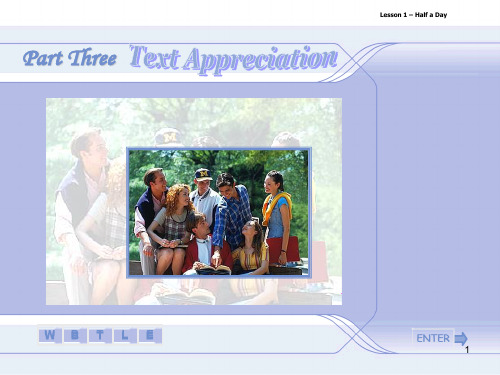
•frightened •surprised •angry •puzzled
•excited
•satisfied •delighted •sad •indifferent
•critical
WB T L E
To be continued on the next page.
11
WB T L E
To be continued on the next page.
Lesson 1 – Half a Day
6
Lesson 1 – Half a Day
I. Text Analysis
Theme of the story
The following are a few possible understandings of the message the story conveys. Which one do you agree with? Argue with your group partners.
Time and tide wait for no man. Life is a tragedy. There is nothing permanent
in life but change. Education can never keep up with changes in
society. Life is short and time is precious. Life is a dream. Do not take anything seriously.
Change is everywhere, from my clothes, to my opinions, to my life and finally to my appearance. Not only I but also the lady and the society are changing, too.
新编英语教程1unit1
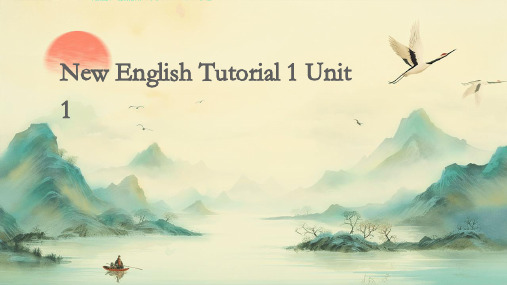
04
提前阅读问题,了解需要回答 的内容和要求。
在听的过程中,注意捕捉关键 信息和细节,记录重要内容。
根据问题类型,选择合适的答 题方法,确保答案准确、完整
。
Listening skills sharing
预测答案
根据问题和听力材料的主题,预测可能的答案。
筛选无关信息
在听的过程中,快速筛选出与问题相关的信息,忽略无关内容。
04
reading comprehension
Reading article analysis
文章主题分析
文章结构分析
文章语言特点分析
文章逻辑关系分析
本篇文章主要探讨了英语学习 的技巧和方法,包括词汇、语 法、阅读和写作等方面的学习 建议。
文章采用了总分总的结构,先 总体介绍了英语学习的重要性 ,然后分别从词汇、语法、阅 读和写作四个方面进行了详细 阐述,最后总结了提高英语学 习的关键因素。
Analysis of Listening Materials
词汇量
评估听力材料中涉及的词 汇量,确定是否超出了学 生的词汇范围。
新概念英语第一册详解

如何自学新概念英语第一册Lessons 1-2课文详注Further notes on the text1.Excuse me 对不起。
这是经常使用于表示道歉的客套话,相当于汉语中的“劳驾”、“对不起”。
当咱们要引发他人的注意、要打搅他人或打断他人的话时,通常都可利用这一表达方式。
在课文中,男士为了吸引女士的注意而利用了这句客套话。
它也可用在以下场合:向生疏人问路,借用他人的,从他人身旁挤过,在宴席或会议半途要离开一会儿等等。
2.Yes?什么事?课文中的Yes?应用升调朗诵,意为:“什么事?”Yes?以升调表示某种不确信或询问之意,也含有请对方说下去的意思。
3.Pardon?对不起,请再说一遍。
当咱们没听清或没明白得对方的话并希望对方能重复一遍时,就能够够利用这一表达方式。
较为正式的说法是:I beg your pardon.I beg your pardon?Pardon me.它们在汉语中的意思相当于“对不起,请再说一遍”或“对不起,请再说一遍好吗?”4.Thank you very much.超级感激!这是一句表示感激的用语,意为“超级感激(你)”。
请看以下类似的表达式,并注意其语气上的不同:Thank you.谢谢(你)。
Thanks!谢谢!5.数字1~10的英文写法1—one 2—two 3—three 4—four 5—five6—six 7—seven 8—eight 9—nine 10—ten语法Grammar in use一样疑问句一样疑问句依照其结构又分为假设干种。
通过主谓倒装可将带有be的陈述句变成一样疑问句。
即将be的适当形式移到主语之前,如:陈述句:This is your watch.这是你的腕表。
疑问句:Is this your watch?这是你的腕表吗?(可参见Lessons 15~16语法部份有关be的一样此刻时形式的说明。
)辞汇学习Word study1.coat n.上衣,外衣:Is this your coat?这是你的外衣吗?coat and skirt<英>(上衣、裙子匹配的)西式女套装2.dress n.(1)连衣裙;套裙:Is this your dress?这是你的连衣裙吗?(2)服装;衣服:casual dress 便服evening dress 晚礼服Lessons3-41.My coat and my umbrella please. 请把我的大衣和伞拿给我。
Lesson1

典例 Could you show us ____A____ a bike?
A.how to mend
B.what to buy
C.where to go
D.how many to buy
【点拨】考查“疑问词+不定式”结构。根据句意“你能 给我们展示如何修自行车吗?”可知选A项。
·He_o_r_g_a_n_i_z_ed__h_o_s_p_i_ta_l_s_, _ta_u_g_h__t _d_o_c_to_r_s__a_n_d_n_u__rs_e_s_,_a_n_d
_sh_魔_o_法w_e_d__p_e_o_p_le__h_o_w__to__g_iv_e__fi_r_s_t _a_id_____. ·He记o忆nce_o_p__er_a_t_e_d__fo_r__si_x_t_y_n_in_e__h_o_u_r_s_s_t_ra_i_g_h_t______
④remain后接分词作表语。接现在分词作表语,表 示正在进行的主动动作;接过去分词作表语, 表示主语所处的状态或已经发生的被动动作。 eg:The situation remained unchanged. 局势依然未变。
典例
D
【点拨】 remain 是系动词,此处应接过去分词seated, 表示主语所处的状态,故选D项。
close friends. 5.This plant can grow in the worst _c_o_n_d_it_i_o_n. It's amazing!
4)Let's do a quick quiz!
1.Who wrote The Story of My Life, a book that is translated into fifty languages? Helen Keller.
新概念英语第一册讲义(完整版)

新(一)讲课步骤一上课(起立问好)1.自我介绍;2.介绍新(一)分三期学完, 本期从第1—48课,全册分三期学完;3.宣读《学生守则》;强调安全及纪律性;二正课部分1. 单词讲解:先让学生逐个起来诵读单词,学生读一个老师讲一个;教师对单词讲解并拓词.单词完先由老师领读(一升一降),然后再找学生带读、齐读。
2. 语法:在黑板上标明“语法”与“语法内容”讲解语法须标明各项内容名称,如“定义”“构成,步骤”等。
语法讲解后领学生做“课堂语法练习题”(或利用练习册语法题部分)或汉译英。
3. 课文:听录音(合着书)回答课题中的问题,要求学生将答案写在书上。
分析课文的内容,划出本课的语法现象(短语、句子)用符号●标出,称为语法符号。
抽词组并对课文中的专有名词(人名、地名)标出音标。
学生齐读或学生分角色朗读课文。
三副课部分1.单词讲解(同正课部分):此部分灵活掌握,如单词较少或补充内容不多,可与正课单词放在一块讲解。
处理课后练习和课课练。
2.语法讲解.四做练习1. 副课填空题:当堂必须全部完成,对答案;2. 句型题要求:A 较简单的题,须说明步骤、技巧。
B 较难的题,须把题型板书到黑板上,再说明做题步骤、技巧。
C 如句型题中出现新的语法现象,须将语法讲解清楚,带着学生做题。
D 句型题根据上课具体情况安排,数个至全部在课堂上由学生完成,其余题或典型题留成作业。
五作业:学生应准备三个本,(两个作业本AB,一个听写本)1.课文(正课)背写一遍→家长签字。
收改;2.单词(正课+副课)带音标抄3遍。
汉语一遍收改(前48课第一期,后两期可省去);3.课后练习题(句型题)做在本子上,前5个或一半,收改;4.课课练与本课对应练习完成。
收改;(其中难题在第四部分上课解决)。
5.单词、课文在下次课上分别听写、默写,100分者在听写本上扣章。
6.奖励方法:听写得连续5个一级棒,换一个小博士, 一期结束,看谁得最多有奖品;六其他:1.收测试卷费,订课课练答案;2.严格遵守“喝茶”及“考试、考勤”制度;3. 试卷考完后利用课堂最后的时间进行讲解,考试内容较多的分次讲解。
新概念第一册lesson113-114课件

• 1. we go to school every day except Sunday.
• 2.Ten students go to the park except Tom. (10-1人)
• 3. Ten students go to the park besides Tom.(10+1人)
Here comes Mary!
Now comes your turn.
由there, here 或now 等引起,谓语为come (或go)的句子
There he comes!
Here she comes!
如果主语为人称代词,仍用自然语序
Here is China’s largest tropical forest. Here are some picture-books.
Have you any small change, sir? 1st PASSENGER: I'm sorry. I've got none.
2nd PASSENGER: I haven't got any either. CONDUCTOR: Can you change this ten-pound note, madam?
board, nor did he.
由neither或nor引起的,表示前面所说的情况 也适用于另一个人(或物)的句子
Neither was I. I was not at the butcher’s, either. Neither do I. I don’t like ice cream, either. So can I. I can swim , too. So did I. I met him, too.
lesson one 语篇精讲
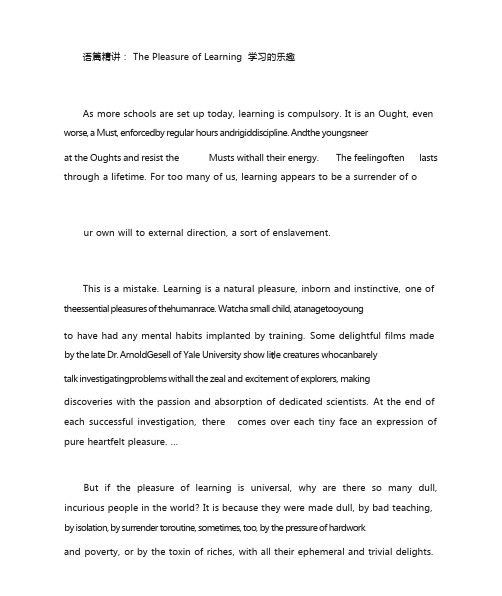
语篇精讲: The Pleasure of Learning 学习的乐趣As more schools are set up today, learning is compulsory. It is an Ought, even worse, a Must, enforcedby regular hours andrigiddiscipline. Andthe youngsneerat the Oughts and resist the Musts withall their energy. The feelingoften lasts through a lifetime. For too many of us, learning appears to be a surrender of our own will to external direction, a sort of enslavement.This is a mistake. Learning is a natural pleasure, inborn and instinctive, one of theessential pleasures of thehumanrace. Watcha small child, atanagetooyoungto have had any mental habits implanted by training. Some delightful films madetalk investigatingproblems withall the zeal and excitement of explorers, makingdiscoveries with the passion and absorption of dedicated scientists. At the end of each successful investigation,there comes over each tiny face an expression of pure heartfelt pleasure. ...But if the pleasure of learning is universal, why are there so many dull, incurious people in the world? It is because they were made dull, by bad teaching, by isolation, by surrender toroutine, sometimes, too, by the pressure of hardworkand poverty, or by the toxin of riches, with all their ephemeral and trivial delights.Withluck, resolutionandguidance, however, the humanmindcansurvive notonly poverty but even wealth.This pleasure is not confined to learning from textbooks,which are too often tedious. But it does include learning from books. Sometimes when I stand in a big library like the library of Congress, or Butler Library at Columbia, and gaze around me at the millions of books, I feel a sober, earnest delight hard to convey except a metaphor. These are not lumps of lifeless paper, but minds alive onthe shelves. Fromeachof themgoes out its ownvoice, as inaudible as the streams of sound conveyedby electric waves beyondtherangeof hearing, andjustas thetouchof abutton on our stereo will fill the room with music,so by opening one of these volumes, one can call into range a voice far distant in time and space, and hear it speaking, mind to mind, heart to heart.But, far beyond books, learningmeans keepingthe mind openand active toreceive all kinds of experience. One of the best-informed menI ever knew was acowboy whorarely reada newspaper andnever a book, but whohadriddenmanythousands of miles through one of the western states. He knew his state as thoroughly as a surgeon knows the human body. He loved it. Not a mountain, not a canyon which had not much to tell him, not a change in the weather that he could not interpret. Andso, amongthe pleasures of learning, we should includetravel,travel with an open mind,an alert eye and a visit to understand other peoples, other places, rather thanlookinginthemfor a mirror imageof oneself. If Iwere a young man today, I should resolve to see ?nbsp;no, to learn ?nbsp; all the 50 states before I was 35.Learningalsomeans learningtopractice, or atleasttoappreciate, anart. Everynew art you learn appears like a new window on the universe; it is like acquiring anew sense. Because I was bornand brought up inGlasgow, Scotland, a hideous19th-century industrial city, I did not understand the slightest thing about architecture until I was in my 20s. Since then, I have learned a little about the art, and it has been a constant delight. ... As for reading books, this contains two different delights. One is the pleasure of apprehendingthe unexpected, suchaswhen one meets a new author who has a new vision of the world. The other pleasure is of deepeningone's knowledge of a special field. ... Learningextendsour lives (as Ptolemy said) into new dimensions. It is cumulative. Instead of diminishing in time, like health and strength, its returns go on increasing, provided ...Provided that you aim, throughout your life, as you continue learning, to integrate your thought, to make it harmonious. If youhappento be anengineerand also enjoy singingina glee club, connect these two activities. They unite inyou; they are not in conflict. Both choral singing and engineering are examples of thearchitectonic ability of man: of his power tomake a large planandtoconvey itclearly to others. Both are aesthetic and depend much on symmetry. Think about them not as though they were dissociated, but as though each were one aspect ofMuch unhappiness has been suffered by those people who have never recognized that it is as necessary to make themselves into whole and harmonious personalities as to keep themselves clean, healthy and financially solvent.Wholeness of the mindandspirit is not a quality conferredby nature, or by God. Itis like health, virtue and knowledge. Man has the capacity to attain it; but to achieveitdepends onhis ownefforts. Itneeds a long, deliberateeffortof themindand the emotions, and even the body.Duringour earthly life, the body gradually dies; eventhe emotions becomeduller. Butthemindinmostof us continues tolive, andevengrows morelively andactive, enjoys itself more, works and plays with more expansion and delight. Many people have played themselves to death,even eaten and drunk themselves to death.Nobody has ever thought himself to death. The chief danger confronting us is not age.It is laziness,sloth,routine,stupidity ?nbsp;forcing their way in like wind through the shutters, seepinginto the cellar like swamp water. Many who avoidlearning, or abandonit, findthatlifeis draineddry. They spend30 years inachair lookingglumly out at the sand and the ocean; ona porchswingwaitingfor somebody to drive down the road. But that is not how to live.No learner has ever run short of subjects to explore. The pleasures of learning are indeed pleasures. In fact, the word should be changed. The true name is happiness. Youcanlive longest and best and most rewardingly by attainingandpreserving the happiness of learning.《学习的乐趣》这篇文章是美籍苏格兰作家吉尔伯特· 哈厄特( Gilbert Highet )写。
新概念第一册-Lesson-121-122 The man in a hat(定语从句)

CAROLINE: Yes. I recognize him now.
Grammar: 定语从句 (attributive clause) 定语从句(形容词性从句),是指一类由关系词 (relative word)引导的从句做主句定语(修饰名词)的句子。 E.g. The boy is Harry Potter. Harry Potter wears glasses. 把上面两个简单句变成复合句要用定语从句,因为第二个句子修饰名词Harry Potter. 定语从句的构成:主句+先行词+关系词+从句 The boy who wears glasses is Harry Potter.
CUSTOMER: I bought two expensive dictionaries here half an hour ago but I forgot to take them with me.
MANAGER: Who served you, sir? CUSTOMER: The lady who is standing behind
先行词关系词 从句 再比如文中:The lady who is standing behind the counter. 这是一个省略句,完整的 句子是“The lady who is standing behind the counter served me. ”其中who is standing behind the counter是一个以关系代词who引导的定语从句,用来修饰名词the
பைடு நூலகம்
customer customer /ˈkʌstəmə(r)/ n. 顾客 (形近词) custom /ˈkʌstəm/ n. 习俗,习惯 (形近词) customs /ˈkʌstəmz/ n. 海关 (联想) merchant /ˈmɜ(r)ːtʃənt/ n. 商人,批发商
新概念一Lesson121-122The man in a hat ppt课件
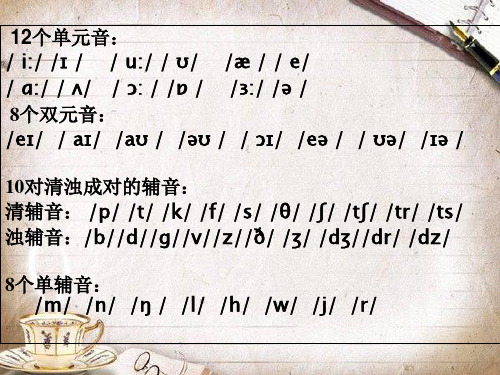
主谓 宾
(是一个完整的句子)
定
例如: This is the man who came here last week. 引导词:who(指人。主语) 被修饰词:the man 翻译:这就是上周来这儿的那个人。
This is the book which I bought yesterday. 引导词: which(指物) 被修饰词:the book 翻译:这就是我昨天买的书。
Heaven helps those who help themselves.
天助自助者。
Lesson121 戴帽子的男士
CUSTOMER: 我买了两本很贵的字典 (expensive dictionaries )--在这里 -半小时前(half an hour ago), 但是我 忘记(forgot to )把他们拿走了。
ago, but I forgot to take them with me.
MANGER: Who served you, sir?
CUSTOMER: The lady who is standing behind the counter.
MANGER: Which books did you buy? CUSTOMER: The books which are on
MANGER: 谁接待您的,先生?
Heaven helps those who help themselves.
天助自助者。
Hale Waihona Puke CUSTOMER: 那个女士-- 站在柜台后 的那位.
MANGER: 您买的是什么书? CUSTOMER: 就是柜台上的两本书。
Heaven helps those who help themselves.
(新编版)五年级英语上册《Lesson 1 Li Ming’s Big Family》教案 冀教版
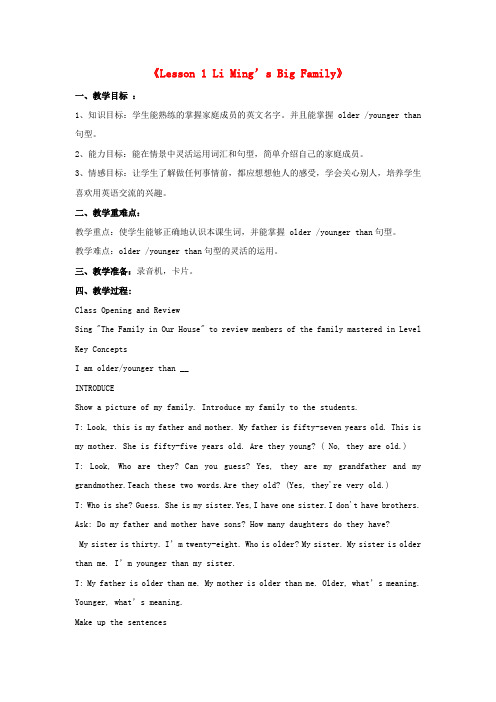
《Lesson 1 Li Ming’s Big Family》一、教学目标:1、知识目标:学生能熟练的掌握家庭成员的英文名字。
并且能掌握 older /younger than 句型。
2、能力目标:能在情景中灵活运用词汇和句型,简单介绍自己的家庭成员。
3、情感目标:让学生了解做任何事情前,都应想想他人的感受,学会关心别人,培养学生喜欢用英语交流的兴趣。
二、教学重难点:教学重点:使学生能够正确地认识本课生词,并能掌握 older /younger than句型。
教学难点:older /younger than句型的灵活的运用。
三、教学准备:录音机,卡片。
四、教学过程:Class Opening and ReviewSing "The Family in Our House" to review members of the family mastered in Level Key ConceptsI am older/younger than __INTRODUCEShow a picture of my family. Introduce my family to the students.T: Look, this is my father and mother. My father is fifty-seven years old. This is my mother. She is fifty-five years old. Are they young? ( No, they are old.) T: Look, Who are they? Can you guess? Yes, they are my grandfather and my grandmother.Teach these two words.Are they old? (Yes, they're very old.)T: Who is she? Guess. She is my sister.Yes,I have one sister.I don't have brothers. Ask: Do my father and mother have sons? How many daughters do they have?My sister is thirty. I’m twenty-eight. Who is older? My sister. My sister is older than me. I’m younger than my sister.T: My father is older than me. My mother is older than me. Older, what’s meaning. Younger, what’s meaning.Make up the sentencesAsk the students to make up the sentences with older /younger than.USE THE STUDENT BOOK AND AUDIOTAPEAsk the students to look at the books. Discuss the pictures:How many people are there in Li Ming’s family?Who are they?Explain Why Li Ming has two grandfathers and grandmothers.Does Li Ming has brothers and sisters?Look at the Smith family.Discuss:Where does Jenny’s family live?Who are in Jenny’s family?How old are they?Play the audiotape as the students follow in their student book.SING A SONGJenny is twelve. Bob is twenty. Bob is older than Jenny. Bob is older than Jenny. Lynn is eight. Lynn is eight. Lynn is younger than Jenny. Lynn is younger than Jenny. PRACTICEAsk the students to introduce their family in groups.PRESENTUSE THE ACTIVITY BOOKClass Closing可向同学们介绍知识窗:同学们你们知道family的由来吗?Family就是Father and mother, I love you.这句话的每一个单词首字母组合而成的。
新概念第一册第121122课精品课件
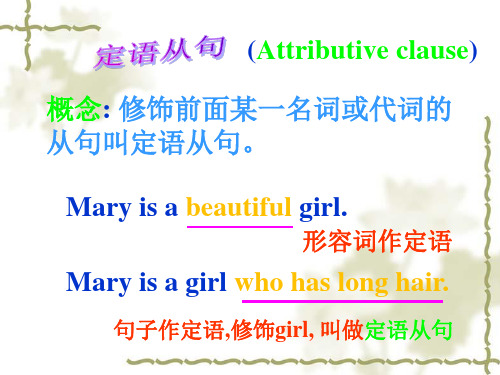
练习:判断who/that 在从句中担任主语还是宾语。
❖ I love singers who write their own songs
主语
❖ He is the man who I met yesterday.
宾语
❖ I like music that I can dance to.
宾语
❖ I prefer a sandwich that is really delicious.
9. My father and his teacher talked a lot about the persons and things _t_h_a_t__ they couldn’t remember.
当先行词同时指人和物时,关系代词 只能用that.
Exercise 2. • Say all __t_h_a_t___ you know. • Is there anything _t_h_a_t__ I can do for you?
当先行词是something, anything, nothing, all 等词时,关系代词只能用that.
4.This is the first play ___th__a_t __ I have seen since I came here.
5. This is the best novel __th_a_t___ I have read. 当先行词被序数词,最高级等词修饰时,关系 代词只能用that.
business man? 7. This is the house in _w_h_i_c_h___ we have lived
for 10 years.
介词后只用which指东西,whom指人
现代大学英语精读1unit3教案

授课班级:英语专业一年级课时安排:2课时教学目标:1. 掌握本单元的关键词汇、短语和常用句型。
2. 理解课文内容,提高阅读理解能力。
3. 培养学生的批判性思维,引导学生对课文内容进行深入思考。
4. 提高学生的口语表达能力,鼓励学生在课堂上积极参与讨论。
教学内容:1. 课文内容:介绍一位著名作家的生平及创作特点。
2. 词汇:掌握本单元的关键词汇,如:biography, creativity, inspiration等。
3. 语法:学习过去时和现在完成时的用法。
4. 阅读策略:引导学生掌握阅读技巧,提高阅读速度和理解能力。
教学步骤:第一课时一、导入1. 教师简要介绍本单元作者及背景知识。
2. 学生分享自己对该作者的了解。
二、课文阅读1. 学生自主阅读课文,注意把握文章大意。
2. 教师提问,检查学生对课文内容的理解。
三、词汇学习1. 教师讲解本单元重点词汇,如:biography, creativity, inspiration等。
2. 学生跟读并练习使用这些词汇。
四、语法学习1. 教师讲解过去时和现在完成时的用法。
2. 学生进行语法练习,巩固所学知识。
五、总结1. 教师总结本节课所学内容,强调重点词汇和语法。
2. 学生回顾本节课所学,提出疑问。
第二课时一、复习导入1. 教师提问,检查学生对上节课所学内容的掌握。
2. 学生分享自己对作者及作品的看法。
二、课文精读1. 学生朗读课文,注意语音、语调。
2. 教师讲解课文中的重点句子和段落。
三、讨论与思考1. 教师提出问题,引导学生对课文内容进行深入思考。
2. 学生分组讨论,分享自己的观点。
四、写作练习1. 教师布置写作任务,要求学生运用本单元所学词汇和语法。
2. 学生独立完成写作任务。
五、课堂总结1. 教师总结本节课所学内容,强调重点。
2. 学生回顾本节课所学,提出疑问。
教学评价:1. 课堂参与度:观察学生在课堂上的发言情况,评价其参与度。
2. 作业完成情况:检查学生的写作练习,评价其语言运用能力。
五年级上英语教案-Unit1 Lesson 6 Maddy's Family-冀教版
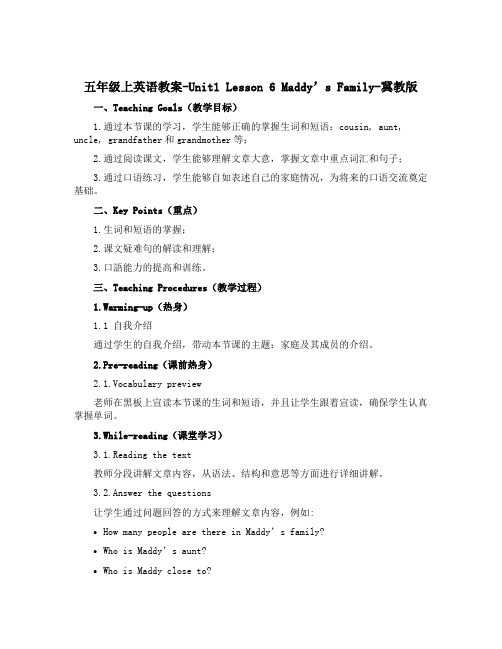
五年级上英语教案-Unit1 Lesson 6 Maddy’s Family-冀教版一、Teaching Goals(教学目标)1.通过本节课的学习,学生能够正确的掌握生词和短语:cousin, aunt, uncle, grandfather和grandmother等;2.通过阅读课文,学生能够理解文章大意,掌握文章中重点词汇和句子;3.通过口语练习,学生能够自如表述自己的家庭情况,为将来的口语交流奠定基础。
二、Key Points(重点)1.生词和短语的掌握;2.课文疑难句的解读和理解;3.口語能力的提高和训练。
三、Teaching Procedures(教学过程)1.Warming-up(热身)1.1 自我介绍通过学生的自我介绍,带动本节课的主题:家庭及其成员的介绍。
2.Pre-reading(课前热身)2.1.Vocabulary preview老师在黑板上宣读本节课的生词和短语,并且让学生跟着宣读,确保学生认真掌握单词。
3.While-reading(课堂学习)3.1.Reading the text教师分段讲解文章内容,从语法、结构和意思等方面进行详细讲解。
3.2.Answer the questions让学生通过问题回答的方式来理解文章内容,例如:•How many people are there in Maddy’s family?•Who is Maddy’s aunt?•Who is Maddy close to?4.Post-reading(课后练习)4.1.Role-play让学生分组,进行小组角色扮演,让学生练习如何在口语之中介绍自己的家人。
4.2.Exercise就课文内容,老师布置相关的练习题,这样有助于学生更好的加深对课文的理解。
5.Homework(作业布置)5.1、Homework 1:写一篇文章,介绍你的家庭成员和他们的工作。
5.2、Homework 2:阅读Unit1 Lesson 6的课文,并且进行试图翻译。
lesson3 Let's learn 肖增教案
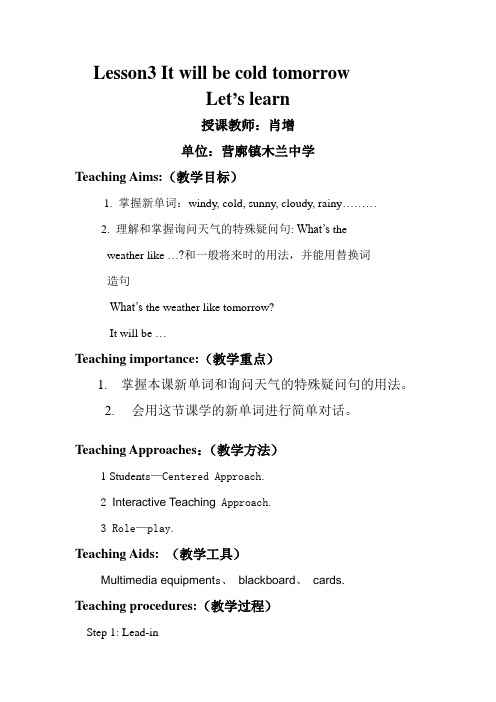
Lesson3 It will be cold tomorrowLet’s learn授课教师:肖增单位:营廓镇木兰中学Teaching Aims:(教学目标)1. 掌握新单词:windy, cold, sunny, cloudy, rainy………2. 理解和掌握询问天气的特殊疑问句: What’s theweather like …?和一般将来时的用法,并能用替换词造句What’s the weather like tomorrow?It will be …Teaching importance:(教学重点)1. 掌握本课新单词和询问天气的特殊疑问句的用法。
2. 会用这节课学的新单词进行简单对话。
Teaching Approaches:(教学方法)1 Student s—Centered Approach.2 Interactive Teaching Approach.3 Role—play.Teaching Aids: (教学工具)Multimedia equipment s、blackboard、cards.Teaching procedures:(教学过程)Step 1: Lead-inIn this step I will show some pictures which related to weather on the screen, and then ask students a question: what’s the weather like today?Step 2: warming upIn this step I will give a song:“how is the weather ?” to the students, and make students feel interested in today’s class.Step 3:导入对话,学生需掌握下列句子What’s the weather like tomorrow?It will be …Step4: pair work(小组合作)In this step, I will use 10 minutes. Firstly, I will make my students in 4 groups, and then I will give tasks to them, then I ask some of them to present their work, and ask other groups to check them. From this the students will learn to cooperate with others.Step5: role-play(角色扮演)In this step, I will use 10 minutes. I will let my students practice the conversations using role-play with pictures on the screen. Examples:1: Girls: What’s the weather like tomorrow?Boys: It will be cold.2: Boys: What’s the weather like tomorrow?Girls: It will be windy.3: Teacher: What’s the weather like tomorrow?Students: It will be sunny.4:Student A: What’s the weather like tomorrow?5:Student B: It will be cloudy.Step6:Practise(练习)In this step I will use 8 minutes. Firstly, I will show some exercise on the screen and ask some students to answer them. From this step students will learn more.Step7:Homework:(作业)1: Recite(背诵)the new words in this class.2: Make conversions(写对话)use the key words.Step8: Blackboard Design.(板书设计)Lesson3 It will be cold tomorrowLet’s learn—What’s the weather like tomorrow?—It will be cold∕windy∕sunny.....四 Teaching Reflection:(教学反思)From this class I learned that it is very important for students to speak out oral English, and as an English teacher I should pay more attention to interactions of teacher and students. The most important for me is to encourage students to speak out.。
新概念英语第一册奇数课和偶数课

新概念英语第一册奇数课和偶数课Unit 1 of "New Concept English" provides an essential foundation in learning English, focusing on odd-numbered and even-numbered lessons. Each lesson is meticulously designed to introduce new vocabulary, grammar structures, and communicative functions progressively. The textbook aims to build a solid framework for English language learners, emphasizing practical usage and cultural insights alongside language acquisition.Odd-numbered lessons typically start with foundational vocabulary and grammar. For instance, Lesson 1 introduces basic greetings and expressions like "Hello," "Good morning," and "Goodbye." It establishes a fundamental dialogue structure that students can adapt to various contexts. Lessons proceed systematically, with each odd-numbered unit reinforcing essential communication skills through dialogue practice, vocabulary exercises, and simple reading comprehension tasks.Conversely, even-numbered lessons delve deeper into grammatical concepts and sentence structures. Lesson 2, for example, focuses on the use of the verb "to be" in affirmative and negative forms, as well as in questions. This lesson expands upon the basic greetings learned in Lesson 1 by integrating new grammatical elements into practical conversations. Students are encouraged to apply these structures through exercises that emphasize accuracy and fluency.Throughout Unit 1, the progression from odd to even lessons ensures a balanced approach to language learning. Odd-numbered lessons prioritize communication skills and vocabulary acquisition, while even-numbered lessons consolidate grammatical understanding and sentence construction. This alternating structure allows learners to grasp both the functional and structural aspects of English effectively.Moreover, each lesson in Unit 1 is designed to be interconnected, building upon previous knowledge while introducing new linguistic elements. This continuity fosters a natural progression in language acquisition, enabling learners to gradually develop their proficiency in listening, speaking, reading, and writing. By the end of Unit 1, students areexpected to confidently engage in basic conversations, understand simple texts, and construct grammatically correct sentences.In conclusion, "New Concept English" Unit 1 offers a comprehensive introduction to the English language through its structured approach to odd and even-numbered lessons. This methodology ensures a well-rounded learning experience that balances vocabulary acquisition, grammar comprehension, and practical application. Through consistent practice and systematic learning, students can lay a solid foundation for further advancement in their English language journey.。
新概念英语第一册教案Lesson1Ecuseme
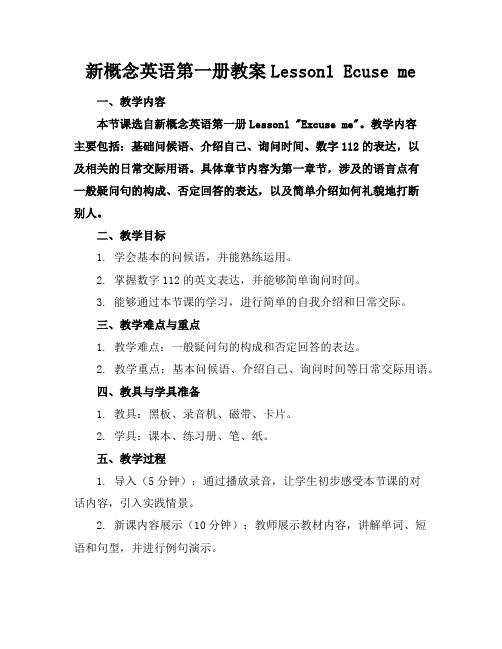
新概念英语第一册教案Lesson1 Ecuse me一、教学内容本节课选自新概念英语第一册Lesson1 "Excuse me"。
教学内容主要包括:基础问候语、介绍自己、询问时间、数字112的表达,以及相关的日常交际用语。
具体章节内容为第一章节,涉及的语言点有一般疑问句的构成、否定回答的表达,以及简单介绍如何礼貌地打断别人。
二、教学目标1. 学会基本的问候语,并能熟练运用。
2. 掌握数字112的英文表达,并能够简单询问时间。
3. 能够通过本节课的学习,进行简单的自我介绍和日常交际。
三、教学难点与重点1. 教学难点:一般疑问句的构成和否定回答的表达。
2. 教学重点:基本问候语、介绍自己、询问时间等日常交际用语。
四、教具与学具准备1. 教具:黑板、录音机、磁带、卡片。
2. 学具:课本、练习册、笔、纸。
五、教学过程1. 导入(5分钟):通过播放录音,让学生初步感受本节课的对话内容,引入实践情景。
2. 新课内容展示(10分钟):教师展示教材内容,讲解单词、短语和句型,并进行例句演示。
3. 例题讲解(15分钟):讲解一般疑问句的构成和否定回答的表达,结合实际场景进行讲解。
4. 随堂练习(10分钟):学生分组进行角色扮演,练习本节课的对话内容。
5. 互动环节(5分钟):学生自由提问,教师解答。
六、板书设计1. 问候语和介绍自己的句型。
2. 数字112的英文表达。
3. 一般疑问句的构成和否定回答的表达。
七、作业设计1. 作业题目:(1)抄写并默写本节课的单词和短语。
(2)用一般疑问句和否定回答完成下列对话。
A: Excuse me, what's the time?B: It'sA: Hi, my name is What's your name?B: My name is(3)根据所学内容,编写一段自我介绍。
2. 答案:(1)见课本附录。
(2)A: Excuse me, what's the time?B: It's one o'clock.A: Hi, my name is Tom. What's your name?B: My name is Jerry.八、课后反思及拓展延伸1. 课后反思:关注学生的学习反馈,针对学生掌握不足的地方进行针对性讲解。
- 1、下载文档前请自行甄别文档内容的完整性,平台不提供额外的编辑、内容补充、找答案等附加服务。
- 2、"仅部分预览"的文档,不可在线预览部分如存在完整性等问题,可反馈申请退款(可完整预览的文档不适用该条件!)。
- 3、如文档侵犯您的权益,请联系客服反馈,我们会尽快为您处理(人工客服工作时间:9:00-18:30)。
文中语言结构
• 教学重点: • 1语言结构:When is Christmas? It’s on December 25. • (能理解并掌握有关日期的句型,并能做替换练习) • 2,交际用语: Merry Christmas!(圣诞快乐) • The toy dog is for you ,Pete.(皮特,玩具狗给你) • Trick or treat?(不给糖吃就恶作剧) • When is Christmas? It’s on December 25 (圣诞节在什么时候?在每年的十二月25日。)
对话
• • • • • • • • S1,S2: Merry Christmas ,Dad. Merry Christmas ,Mum 爸爸,圣诞快乐,妈妈,圣诞快乐! T: Merry Christmas ,Children.孩子们,圣诞快乐 S2: Where are our presents?我们的礼物在哪儿 T: Go to the sitting room and find them.到起居室去找他们 S1: Oh, what a beautiful tree!噢,好漂亮的圣诞树呀 S2: Oh , so many presents on it.噢,树上如此多的圣诞礼物 T: This toy dog is for you, Pete. These picture books are for you, Ann.这个玩具狗是给皮特的,漫画书是给安娜的 • S2: The hat is for Mum.这个帽子是给妈妈的 • S1: The watch is for Dad.那个表是给爸爸的
A. window B. front door C. chimney
4. On the morning of Christmas Day children wake up their parents very
early and say “___________”.
A. Good morning! B. Merry Christmas! C. Best wishes to you!
Christmas
trees
•
Star 星星
词
组
Merry Christm (圣诞节快乐 ) Dress up as (打扮成 装扮成) Trick or treat (不给糖吃就恶作剧) From door to door (挨家挨户) Sitting room (起居室 )
Father Christmas
练习和扩展
• • • • • Prctice 问答练习 When is Christmas? It’s on Dcember 25. When is Halloween? It’s on October31 When is Mother’s Day? It’s the second Sunday in May. • When is Thanksgiving Day? It’s the fourth Thursday in November. • (各种形式进行问答练习)
Lesson 11 Merry Christmas!
大家圣诞快乐
先让大家看几张万圣节的图片
圣诞节在什么季节呀
冬天
圣诞节快到了,好快乐 ! merry
Christmas
mask
October
Halloween
lantern
dress
dress up as father christmas .
5. On Christmas day, people often ______ to each other.
A. give presents
B. ask for money
C. ask for presents
festival
圣诞节即将来临,祝同学圣诞节快乐
•Thanks everyone
故事习俗
stockings
长桶袜
Christmas
圣诞晚饭
dinner
•
Christmas card
Choose the right answer.
1.Christmas Eve is _________.
A. the night before December 24 C. the night of December 24 B. the night of December 25
Father Christmas
圣 诞 老 人
dress up 装扮 as
Father Christmas
圣诞老人
圣诞老人从烟囱将礼物 放进你的短袜
chimney
烟囱
圣诞老人为什么 会受孩子们欢迎 ?因为他会在圣 诞夜里给孩子们 送礼物,从烟囱 下来,将你想要 的礼物装进你的 短袜里,第二天 candy
present
单词和词汇
Merry(快乐 越快) Christmas(圣诞节) mask(面具) October(十月) Halloween(万圣节前夕) lantern(提灯 灯笼) dress(打扮 装饰) dress up as(装扮成) ghost(鬼魂 鬼) trick or treat(不请吃糖就恶作剧) candy(糖果) from door to door(挨家挨户)
2.Father Christmas often puts the presents________.
A. into children’s hats C. into children’s shoes B. into children’s stockings
3. Father Christmas comes into the house through the _________.
